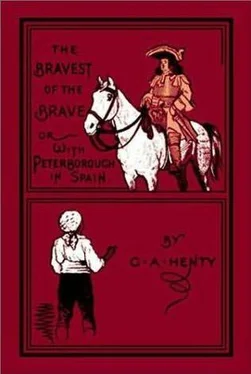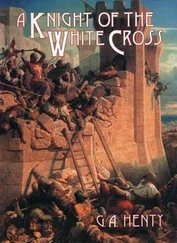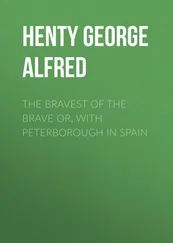Mahony having received the earl's word for his safety rode out to the appointed place to meet him, accompanied by several of the principal Spanish officers. Peterborough first used every persuasion to induce Mahony to enter the service of King Charles, but the Irish officer refused to entertain the tempting offers which he made. Peterborough then changed his tone, and said with an air of kindly frankness:
"The Spaniards have used such severities and cruelties at Villa Real as to oblige me to retaliate. I am willing to spare a town if under your protection. I know that you cannot pretend to defend it with the horse you have, which will be so much more useful in another place if joined with the troops of Arcos to obstruct my passing the plains of Valencia. I am confident that you will soon quit Murviedro, which I can as little prevent as you can hinder me from taking the town. The inhabitants there must be exposed to the most abject miseries, and I can in no way preserve it but by being bound in a capitulation, which I am willing to give you if I have the assurance of the immediate surrender of the place this very night. Some cases are so apparent that I need not dissemble. I know you will immediately send to the Duke of Arcos to march to the Carthusian convent and meet him there with the body of horse under your command."
The earl further offered, in the same apparent spirit of frankness, to show Mahony all his troops and artillery, as well as the large resources he had upon the sea, which was only six miles off. Mahony was entirely deceived by the manner of the man he regarded as a relative, and laughingly acknowledged that he had, in case of necessity, intended to fall back with his cavalry upon the Duke of Arcos. The interview ended by Mahony retiring to the town, agreeing to send back an answer in half an hour. At the end of that time he sent out a capitulation by a Spanish officer.
Had Peterborough's scheme ended here he would not have exceeded the bounds of what is regarded as a fair method of deceiving an enemy, but his subsequent proceedings were absolutely indefensible, and are, indeed, almost incredible on the part of the man who in some respects carried the point of honor almost to an extreme. His notion, no doubt, was to paralyze the action of the enemy by exciting suspicions of treachery among their leaders, but the means which he took to do so were base and unworthy in the extreme.
He began with the Spanish officer who had brought the capitulation, giving him a garbled account of his interview with Mahony, and then endeavoring to bribe him to desert to the Austrian cause, insinuating that he had succeeded by this means with Mahony. As the earl expected, he failed to induce the Spaniard to desert, but he succeeded in his purpose of filling his mind with suspicions of treachery on the part of Mahony.
Mahony had conducted the negotiations in a manner worthy of a loyal and skillful officer; he had stipulated not to leave the town till one o'clock in the morning, and that Peterborough should not pass the river until that hour.
This he had arranged in order to allow the Duke of Arcos time to reach the plains, where he was to be joined by the horse from Murviedro. But Peterborough's machinations had been effectual; the Spanish officer, on his return, informed his countrymen that Mahony had betrayed them, and the troops and populace became enraged against the unfortunate Irishman and threatened his life. Peterborough, who, in spite of his perverted notions of honor, would not on any account have passed the river before the time stipulated, heard the neighing of horses in the town and supposed that some of the troops were leaving it. In order, therefore, to create suspicion and confusion among the enemy, he ordered a body of men near the river to fire straggling shots as if small parties were engaged at the outposts.
Mahony hearing these sounds sent word that whatever collision might have occurred it was the result of no breach of the terms of capitulation on his part, and that, depending implicitly on the honor of an English general, he could not believe that any foul play could take place. Peterborough sent back his compliments by the officer who brought the message, with expressions of gratification at the good understanding which prevailed between them, and at the same time he proposed that Mahony, for the security of the inhabitants of Murviedro, and to prevent his troops being molested as they retired from the town, should permit a regiment of English dragoons to cross the river and to form a guard at the gates, offering at the same time to deliver up a number of his officers as hostages to the Spanish for the loyal fulfillment of the terms.
In an evil hour for himself Mahony consented to the proposal. When the Spaniards saw Peterborough's dragoons advancing without opposition through the difficult pass, and up to the very gates of the town, their suspicions of the treachery of their leader became a certainty. The Spanish officers each got his company or troop together as quickly as possible and hurried across the plain to the camp of the duke, where they spread a vague but general panic. The officers accused Mahony of treachery to the Spanish general, and the national jealousy of foreigners made their tale easily believed; bat Peterborough had taken another step to secure the success of his diabolical plan against the honor of his wife's relative.
He made choice of two Irish dragoons, and persuaded them by bribes and promises of promotion to undertake the dangerous part of false deserters, and to tell the tale with which he furnished them. They accordingly set out and rode straight to the camp of the Duke of Arcos and gave themselves up to the outposts, by whom they were led before the Spanish general. Questioned by him, they repeated the story they had been taught.
The statement was that they had been sitting drinking wine together under some rocks on the hillside, close to where the conference was held, and that Peterborough and Mahony, walking apart from the others, came near to where they were sitting, but did not notice them, and that they saw the earl deliver five thousand pistoles to Mahony, and heard him promise to make him a major general in the English army, and to give him the command of ten thousand Irish Catholics which were being raised for the service of King Charles. They said that they were content to receive no reward, but to be shot as spies if Mahony himself did not give proof of treachery by carrying out his arrangements with the earl, by sending a messenger requesting the duke to march that night across the plain toward Murviedro to the Carthusian convent, where everything would be arranged for their destruction by a strong ambush of British troops.
Scarcely had the men finished their story when an aide de camp galloped in from Mahony with the very proposition which they had reported that he would make. Arcos had now no doubt whatever of Mahony's treason, and instead of complying with his request, which was obviously the best course to have been pursued, as the junction of the two armies would thereby have been completed, the duke broke up his camp without delay and fell back in exactly the opposite direction.
This was exactly what Peterborough had been scheming to bring about. Mahony, with his cavalry, having delivered over the town, marched to the Carthusian convent, and there, finding themselves unsupported, rode on to the spot where the duke had been encamped, and finding that his army was gone, followed it. On overtaking it Mahony was instantly arrested and sent a prisoner to Madrid.
It is satisfactory to know that he succeeded in clearing himself from the charge of treachery, was promoted to the rank of major general, and was sent back with Las Torres, who was ordered to supersede the Duke of Arcos.
The success of the earl's stratagem had been complete. Without the loss of a single man he had obtained possession of Murviedro, and had spread such confusion and doubt into the enemy's army that, although more than three times his own force, it was marching away in all haste, having abandoned the siege of Valencia, which city he could now enter with his troops. The success was a wonderful one; but it is sad to think that it was gained by such a treacherous and dastardly maneuver, which might have cost a gallant officer-- who was, moreover, a countryman and distant connection of the earl --his honor and his life.
Читать дальше












